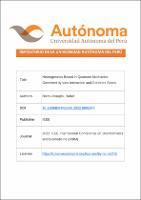| dc.contributor.author | Nieto-Chaupis, Huber | |
| dc.date.accessioned | 2023-10-04T16:24:44Z | |
| dc.date.available | 2023-10-04T16:24:44Z | |
| dc.date.issued | 2022 | |
| dc.identifier.uri | https://hdl.handle.net/20.500.13067/2650 | |
| dc.description.abstract | Under the assumption that neurogenesis is a fully random process then some laws such as the ones belonging to quantum mechanics might be applied. In this paper, it is assumed that along the process of creation of new neurons, some phases such as proliferation and creation would consist in quantum coherent states in the sense that the formation of new neurons might be synchronized. Thus the ion-dependence formalism of quantum mechanics is employed, with a special emphasis to the usage of evolution operator Hamiltonian governed by Coulomb forces. | es_PE |
| dc.format | application/pdf | es_PE |
| dc.language.iso | eng | es_PE |
| dc.publisher | IEEE | es_PE |
| dc.rights | info:eu-repo/semantics/restrictedAccess | es_PE |
| dc.rights.uri | https://creativecommons.org/licenses/by-nc-nd/4.0/ | es_PE |
| dc.subject | Proteins | es_PE |
| dc.subject | Biological system modeling | es_PE |
| dc.subject | Neurons | es_PE |
| dc.subject | Quantum mechanics | es_PE |
| dc.subject | Coherence | es_PE |
| dc.subject | Ions | es_PE |
| dc.subject | Probabilistic logic | es_PE |
| dc.title | Neurogenesis Based in Quantum Mechanics Governed by Ions Interaction and Coherent States | es_PE |
| dc.type | info:eu-repo/semantics/article | es_PE |
| dc.identifier.journal | 2022 IEEE International Conference on Bioinformatics and Biomedicine (BIBM) | es_PE |
| dc.identifier.doi | https://doi.org/10.1109/BIBM55620.2022.9995047 | es_PE |
| dc.subject.ocde | https://purl.org/pe-repo/ocde/ford#2.02.04 | es_PE |


